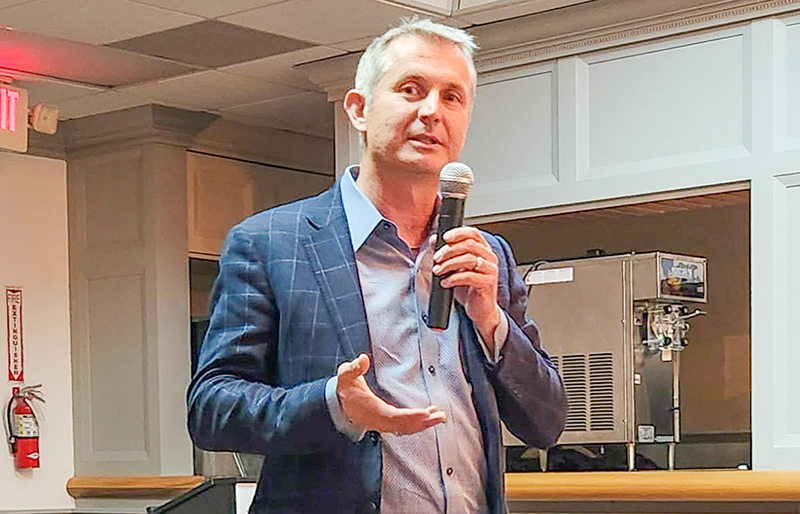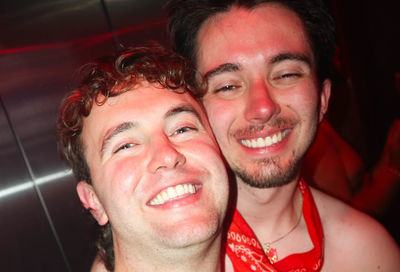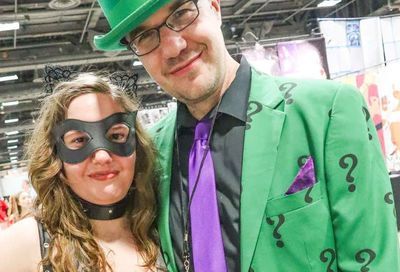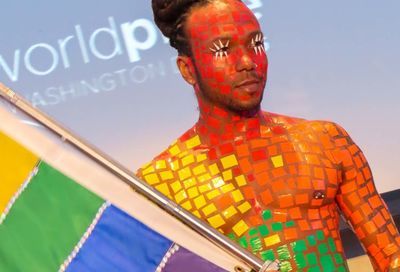Sharmus Outlaw, transgender HIV and sex worker rights advocate, dies
Internationally-known activist Sharmus Outlaw mourned by close friends and co-workers after losing her battle with lymphoma

Sharmus Outlaw passed away Thursday morning at Capital Caring Hospice Center in Falls Church, Va., from complications related to lymphoma. The D.C.-based activist and transgender woman was internationally known for her work as a policy advocate for sex workers, people living with HIV, and transgender women of color.
The death of Outlaw, 50, , came as a surprise to many who knew her, some of whom weren’t aware she was fighting cancer.
“So many people have said to me, ‘Sharmus was so vibrant and so strong, we can’t believe that she was even sick,'” says Dr. Penelope Saunders, a longtime friend and fellow sex worker advocate, who collaborated with Outlaw on a variety of initiatives. “Now she was sick in the last few weeks of her life, but even with the lymphoma she had, she would literally get up after receiving treatment and go straight to a conference to advocate. And people would say to her, ‘You look really good.’ So her vibrancy and her strength make it hard for people to believe she’s passed.”
Outlaw’s resume was extensive. She was a policy advocate at the Best Practices Policy Project, primarily focusing on the rights of transgender communities and health care access. She served as U.S. representative for the Programme Advisory Committee of the Red Umbrella Fund, a global fund to support sex worker-led organizations. She was also a co-founder of Different Avenues, a local nonprofit for LGBT people engaged in sex work, and was co-coordinator of the Desiree Alliance, an international sex worker advocacy organization.
Saunders first met Outlaw after arriving in Washington in 2000 to serve as the executive director of HIPS. The two women became close friends, so much so that Saunders’ daughter considered Outlaw her aunt.
“Sharmus was a woman of great poise, very persuasive and charismatic speaker,” says Saunders. “She could structure an argument extremely clearly and convincingly, and change people’s hearts and minds. When she would speak, everyone within the radius, as far as she could be heard, would stop, pay attention and listen to her words.”
Saunders also remembers Outlaw as a very philosophical person, extremely spiritual and interested in learning about different faith backgrounds, particularly from a trans perspective. In the early ’00s, she accompanied Outlaw to submit an application for a passport reflecting her correct gender — something that, at the time, was nearly impossible for transgender individuals. When the application was approved and Outlaw received her passport, she told other transgender people how they could do the same.
Outlaw was someone who lived her activism. When she went to visit her family in Kinston, N.C., she would always take along HIV-related educational literature and condoms because she knew that access to information about safe sex was not readily available to people in rural areas.
As a result, Outlaw often served as a point-person or resource for LGBT people in her home state, and had dreams of doing a greater amount of HIV-related education and advocacy on behalf of rural or low-income populations in the future.
Tiommi Jenae Luckett, an Arkansas-based HIV activist, first encountered Outlaw in April 2015 at AIDS Watch advocacy conference in Washington, D.C. The two women bonded over their shared experiences as transgender women of color working on HIV-related issues.
Outlaw later interviewed Luckett for a research paper being published by the Best Practices Policy Project, “Nothing About Us Without Us.” Aafter the project was completed, Outlaw reached out in a more personal capacity, and the two became fast friends.
“Sharmus was the sweetest person that I have ever met,” says Luckett. “She was so concerned about my well-being and my happiness. If ever she knew I was upset about something, she was going to be the first one to call…. She was sending out prayers for me when I lost my mom, and when I lost another trans sister to cancer.”
Luckett, who viewed Outlaw as both a close friend and a mentor, recalls a friendship forged over months where the two would talk on the phone almost every day.
“From the very first conversation, it was effortless in talking with her,” Luckett says. “The amount of information we exchanged with each other as complete strangers — I don’t do that! And come to find out, that’s not what she was like, either. [But] our relationship just grew from there. She was the sister I always wanted.”
Darby Hickey, a local transgender activist, met Outlaw when she first moved to D.C., with the two frequently crossing paths. Hickey remembers her as a “really phenomenal person and activist” concerned with advancing justice and human rights. The two worked in coalition with a number of others on a 2008 report titled “Move Along,” focusing on how police interact with people they profile as sex workers.
“She was an amazing person. She was not afraid to speak out and stand up to what she felt was injustice,” says Hickey. “She was experiencing so many of the injustices that happen in our society, and she was fighting back against them, not only for herself, but for everyone who would come after her.”
When Hickey visited Capital Caring Hospice Center after hearing of Outlaw’s death, staff told her that, as a result of their interactions with Outlaw, they would be implementing cultural competency training to help staffers learn how best to treat transgender patients.
“It’s ironic, and so Sharmus, that she would go to some place that was not what we would consider particularly transgender-friendly, and force them to change,” says Hickey.
Hickey has started an IndieGoGo page to help raise funds for Outlaw’s final expenses, which include the costs of transportation, as she wished to be buried in her home state of North Carolina. So far, the page as raised over $2,000, with proceeds going to help Outlaw’s mother, Aura Lee, foot the bill for her daughter’s funeral costs.
Outlaw, who had been scheduled to speak at the Desiree Alliance’s Conference on “The Sex Workers Rights Movement” next week, will be honored as part of a memorial service on Monday, July 11 from 2 p.m. to 3:30 p.m., when she would have been presenting. Hickey says there are also plans to have a memorial service in D.C., with organizers looking at next Friday, July 15, as a possible date.
Transgender activist Ruby Corado remembers Outlaw as someone who was not only exceedingly kind, but put others before herself.
“She was laid-back, she didn’t like conflict. She liked helping people,” Corado says. “She always put people first. When I got shot in 2008, she was there for me. She was there in a lot of my bad moments. That’s what people will remember about her: when anyone was going through something, she was there.
“She was just one of those few girls that didn’t have hate for anybody.”
Support Metro Weekly’s Journalism
These are challenging times for news organizations. And yet it’s crucial we stay active and provide vital resources and information to both our local readers and the world. So won’t you please take a moment and consider supporting Metro Weekly with a membership? For as little as $5 a month, you can help ensure Metro Weekly magazine and MetroWeekly.com remain free, viable resources as we provide the best, most diverse, culturally-resonant LGBTQ coverage in both the D.C. region and around the world. Memberships come with exclusive perks and discounts, your own personal digital delivery of each week’s magazine (and an archive), access to our Member's Lounge when it launches this fall, and exclusive members-only items like Metro Weekly Membership Mugs and Tote Bags! Check out all our membership levels here and please join us today!



























You must be logged in to post a comment.